Developmental editing sets your book on a trajectory to reach your readers and impact audiences. In fact, a developmental edit is so crucial that even authors pursuing traditional publication often hire a book coach to walk them through this type of edit.
If you wonder how to edit a book, developmental editing is your first step in the right direction. In this article, we cover everything you need to know about developmental edits. And trust us, with over 7,000 authors coming through our school, we know where the hang-ups are!
Does this feel like a bit of a whirlwind? That’s okay! Whether you’re learning how to publish a book for the first time or just looking for a refresher, this blog is for you.
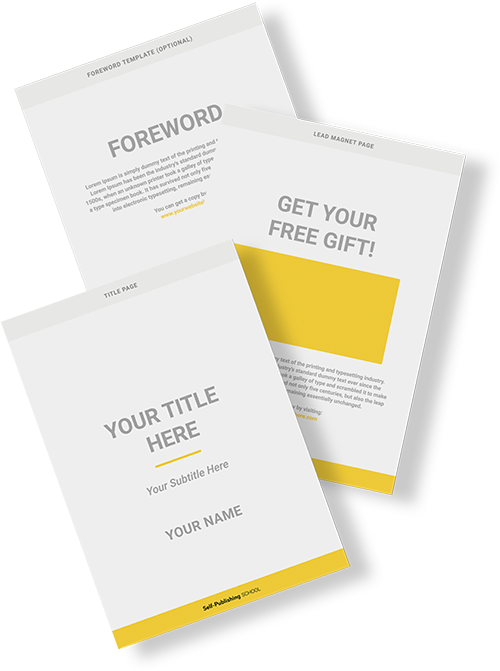
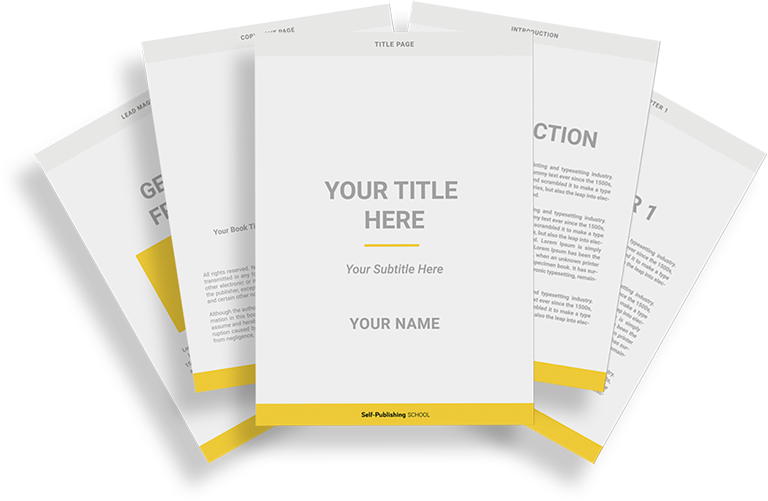
Book Outline Generator
Choose your Fiction or Nonfiction book type below to get your free chapter by chapter outline!
Book Outline Generator
Enter your details below and get your pre-formatted outline in your inbox and start writing today!
CONGRATULATIONS
Thanks for submitting! Check your email for your book outline template.
In the meantime, check out our Book Outline Challenge.
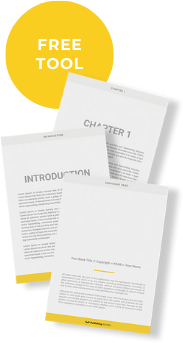
Developmental editing: what’s covered
- What is the difference between copyediting and developmental editing?
- What do developmental edits look like?
- Is a developmental edit worth it?
- What is structural vs developmental editing?
- How do I know if I need a developmental editor?
What is the difference between copy editing and developmental editing?
Developmental editing is the first phase in your editing process, whereas copy editing is one of the last (just before a proofread). If you’re writing a book for the first time, it’s crucial that you don’t miss this editing stage.
We get into the specifics of developmental editing, but at a macro level, here are a few pointers that differentiate this type of edit from a copy edit.
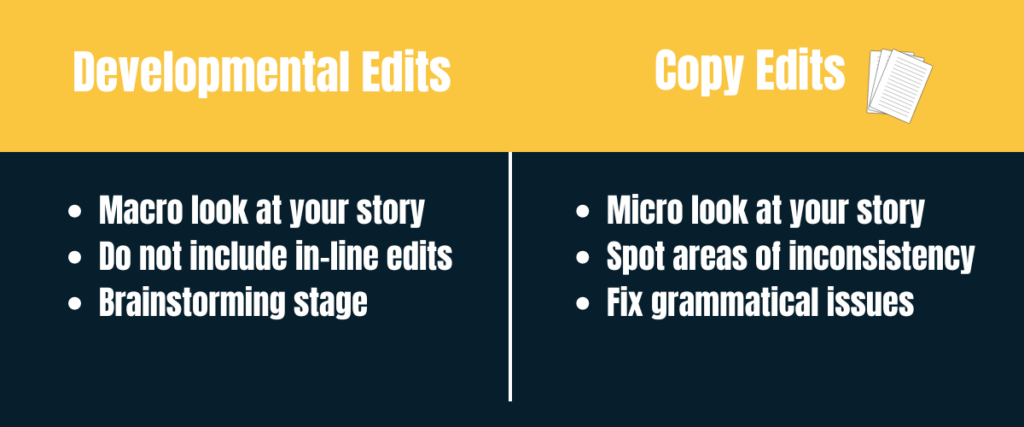
Developmental edits:
- Take a macro look at your story
- Do not include in-line edits from your editor
- Are a type of brainstorming stage
However, copy edits take a different angle. Once you take your manuscript through the developmental stage, as long as a few others, it’s time to focus on copy edits.
Copy edits:
- Focus on your copy at a micro level
- Spot areas of inconsistency
- Fix grammatical issues
While a developmental edit focuses on the development of your manuscript (hence, the term), a copy edit focuses on the copy itself.
What do developmental edits look like?
Developmental editing takes place when you hire a professional editor to spot structural issues and identify areas for improvement. This process can be extremely enjoyable, as long as you and your editor are on the same page.
When I was working on enhancing my work-in-progress, I reached out to an editor my writing mentor recommended. While she published in a different genre, she loved mine. Because writing rules overlap genres, I decided to work with her.
We spent hours combing through my manuscript word by word. I respected her expertise and took her edits to heart. Despite her track record and bestselling status, she recognized my role as the author and deferred all edits, and the final calls, to me. This is the beauty of developmental edits. You, the author, make all in-line edits.
This was an incredible working relationship. She spotted issues I could not detect because I was so close to the work. She also encouraged me in my writing, drew out my unique author voice, and positioned me for success.
Be sure your developmental editor is familiar with your genre and likes your writing voice. Because this type of edit is a macro look at your story, it’s also crucial that your editor is big-picture minded.
Is a developmental edit worth it?
Whether or not developmental editing is worth it depends on your author goals, but I would strongly suggest you invest in this edit. The importance of a developmental edit can’t be overstated.
I am so thankful for all the lessons I learned simply by working with a bestselling author. If you want to learn, really learn, about the writing world, invest in a writing coach. Of course, they will they teach you how to further develop your manuscript. But in addition, you’ll learn a plethora of writing tips and tricks you didn’t know you didn’t know.
For example, you could learn all about:
- Direct characterization
- Active voice
- Plotting versus pantsing
- Point of view characters
- How to use language to set the tone
Outside of what you receive from developmental editing, the shop talk and real world experience will take you far in your author journey.
If you can’t invest in developmental editing at the moment, consider working with a writing coach for a session or two. Coaches teach you how to look at your manuscript. Then, you can apply their notes to your own edits.


Book Outline Generator
Choose your Fiction or Nonfiction book type below to get your free chapter by chapter outline!
Book Outline Generator
Enter your details below and get your pre-formatted outline in your inbox and start writing today!
CONGRATULATIONS
Thanks for submitting! Check your email for your book outline template.
In the meantime, check out our Book Outline Challenge.

What is structural vs developmental editing?
Developmental editing focuses on the big picture, such as your premise and concept, while structural editing focuses on how you organize the concept into a cohesive whole.
At this point, you may wonder, “Is developmental editing just semantics?” You’re not alone. Learning the language of the publishing world can get tricky, so hang with me! To help you firmly grasp this concept, consider an empty plot of land. You want to build a house on this land and are eager to begin.
While there are many details in the process, one of the early steps you’ll take is deciding what you want your house to look like. What is the concept?
- Farm house?
- A ranch style home?
- Mid-century modern?
This is your premise or overall concept (developmental edit).
Next, you need to decide how you want each room to flow into the next. Literally, what is the structure going to look like? What is the frame your builders will need to create? This aspect defines how cohesive your home will look once it’s built (structural edit).
Of course, builders don’t have the luxury of creating a home and then going back to make changes. They draw up floor plans. (If you resonate with this style, you may be a plotter.)
If you prefer to dive into your story and simply write, of course, do so! Just remember that you will likely need to make larger edits later on. This leads us into our next question.
How do I know if I need a developmental editor?
If you are a successful author of many books, you may be able to get by without working with a developmental editor. However, I’d still argue that an outside, professional opinion is a good idea! (This is one reason why our authors each get paired with their own, personal coach.)
But let’s say this is your debut novel, your first nonfiction, or you just don’t have too many titles under your belt yet. How do you assess if you need developmental editing? Here are a few questions to consider before taking the leap.
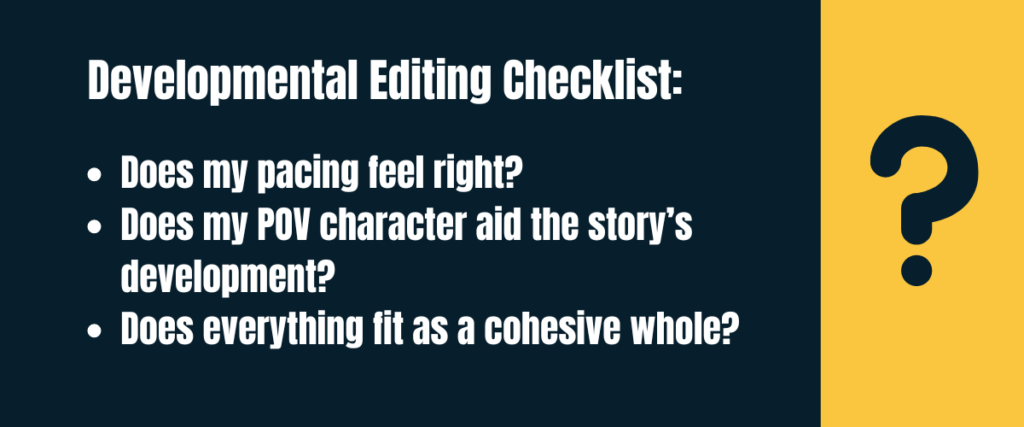
1. Does my pacing feel right?
If your pacing doesn’t flow, it’s time to work with a professional editor. Pacing is a huge determiner in the success (or failure) of your book.
My writing coach often likened the pacing of the story to the tension of a roller coaster: sometimes the tension is ascending to the summit (rising action) and sometimes it’s the rush of descent, but always, there should be tension.
Just as those riding a roller coaster need a moment to catch their breath, so do your readers. If you constantly write action scenes, be sure to give your reader the mental breaks they need.
2. How does my point of view character aid the story’s development?
If your story and your protagonist feel like two different entities, again, it’s time to hire an editor. What exactly does this mean? Your point of view (POV) character needs to help the story evolve, just as your story enables your POV character to evolve. The two work together.
The development of your point of view character is the scaffolding the rest of your story hangs on. Whether you write fiction or nonfiction, a compelling protagonist is a must. One aspect to consider when deciding whether or not to invest in a developmental edit is the state of your character.
Protagonists often need to be round characters. This means that they embody a strong character arc, and look different at the end of the story than they did at the end. Of course, this isn’t always the case, but as a rule of thumb, it’s a helpful goal to target. A developmental editor can help you work out not just your plot, but your characters as well.
3. Does everything fit as a cohesive whole?
If your writing feels like forcing a puzzle piece into a space it doesn’t belong in, you guessed it, it’s time to hire an editor! As you develop your story, take notice of where plot points and scenes fit together and where they feel forced.
Developmental editors have an eye for detail. They know what works, what doesn’t, and most importantly, the reason why. They can guide you through the literal development of your story and consequent edits as well.
Remember, the more work you put in up front, the less effort you need to expend later. Working with a developmental editor will help set your story up for success.
Developmental editing: how to move forward today
Now that you know all about developmental edits and why they matter, it’s time to put that knowledge into practice and outline your book! To help you get started, take advantage of our free Book Outline Generator.
Simply choose your genre (fiction or nonfiction) to get started with your chapter by chapter outline. Use this outline as a guide to the development of your book.
If you need hands-on help, simply reach out to us. We’ve helped over 7,000 authors and we’re here for you, too!


Book Outline Generator
Choose your Fiction or Nonfiction book type below to get your free chapter by chapter outline!
Book Outline Generator
Enter your details below and get your pre-formatted outline in your inbox and start writing today!
CONGRATULATIONS
Thanks for submitting! Check your email for your book outline template.
In the meantime, check out our Book Outline Challenge.

Frequently Asked Questions
What is the difference between copyediting and developmental editing?
Copyediting focuses on correcting grammar, punctuation, and spelling. Developmental editing looks at the big picture, including structure, plot, and character development. It’s about making sure your story flows well and makes sense.
What do developmental edits look like?
Developmental edits include detailed feedback on your manuscript’s structure, plot, characters, and pacing. You’ll get suggestions on what to add, remove, or change to improve the overall story.
How do I know if I need a developmental editor?
If your story feels off or you’re unsure about the structure, plot, or character development, you might need a developmental editor. They help refine your story to make it the best it can be.
How much does a developmental edit cost?
The cost varies depending on the editor’s experience and the length of your manuscript. It can range from a few hundred to a few thousand dollars. Always get a quote before starting.
What can I expect from a developmental editor?
You can expect a detailed critique of your manuscript, focusing on structure, plot, and character development. They’ll provide actionable suggestions to improve your story and help you understand what works and what doesn’t.
When should you hire a developmental editor?
Hire a developmental editor after you’ve completed your first draft but before you start the copyediting process. This way, you can make significant changes to the structure and content without worrying about minor errors.

